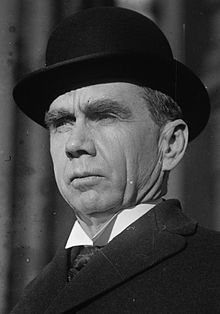Daniel Calhoun Roper
| Daniel C. Roper | |
|---|---|
 |
|
| 7th United States Secretary of Commerce | |
|
In office March 4, 1933 – December 23, 1938 |
|
| President | Franklin D. Roosevelt |
| Preceded by | Roy D. Chapin |
| Succeeded by | Harry L. Hopkins |
| 5th United States Ambassador to Canada | |
|
In office May 19, 1939 – August 20, 1939 |
|
| President | Franklin D. Roosevelt |
| Preceded by | Norman Armour |
| Succeeded by | James H. R. Cromwell |
| Personal details | |
| Born | April 1, 1867 Marlboro County, South Carolina, United States |
| Died | April 11, 1943 (aged 76) Washington, D.C., United States |
| Resting place | Rock Creek Cemetery, Washington, D.C., United States |
| Political party | Democratic |
| Spouse(s) | Lou McKenzie Roper (m. 1889 - 1943, his death) |
| Children | Margaret May Roper James Hunter Roper Daniel Calhoun Roper, Jr. Grace Henrietta Roper John Welsey Roper II Harry McKenzie Roper Richard Frederick Roper |
| Alma mater | Duke University |
| Profession | Government |
| Religion | Methodist |
Daniel Calhoun Roper (April 1, 1867 – April 11, 1943) was a U.S. administrator who served as the 7th United States Secretary of Commerce under President Franklin D. Roosevelt, and was the 5th United States Ambassador to Canada from May 19, 1939 until August 20, 1939.
Daniel Calhoun Roper was born in Marlboro County, South Carolina to John Wesley Roper who was the leader of the 18th Regiment of North Carolina troops in the Confederate Army. After two years at Wofford College Roper attended Duke University (then called "Trinity College") and received an A.B. in 1888, and he received his bachelor of laws degree from National University in 1901.
On December 25, 1889, Roper married Lou McKenzie. They had seven children: Margaret May, James Hunter, Daniel Calhoun, Jr., Grace Henrietta, John Welsey Roper II (future Vice admiral), Harry McKenzie (future Major general) and Richard Frederick Roper.
Roper taught school for four years and then, in 1892 at the age of 25, was elected to the South Carolina House of Representatives where he served for two years. He moved to Washington and worked as a clerk for the U.S. Senate Committee on Interstate Commerce. From 1900 to 1910, he worked for the Census Bureau, and then served as the clerk of the Committee on Ways and Means in the U.S. House of Representatives from 1911 to 1913.
...
Wikipedia
